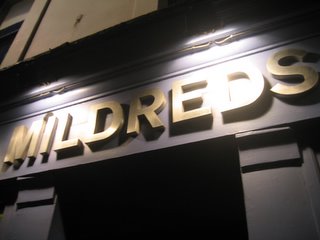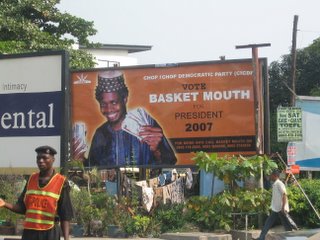Despite the monochrome cold, London was as usual excessively inspiring; I return full of creative energy and a desire to be part of the utter transformation of Nigeria. We spent the first couple of days with my parents touring the great Victorian Institutions: at the Victoria and Albert Museum we stood in front of a 5th century statue of the Buddha, walked through the Japan rooms (and admired the series of Edo-period costumes that are to Nigerianised eyes like oriental agbadas) and then toured the fashion section with its fascinating “history of the gentleman’s suit” from 18th century frock to modern day Armani. We also went to the Contemporary China temporary exhibition. What was interesting was to see the ways in which upcoming Chinese artists are using their own cultural stock to subvert and challenge what it is to be Chinese: a series of nine photography portraits of a shaven headed man, the first image with a few characters of script inked onto his face, the last image with his face completely blackened with ink, the images in between showing him increasingly “written on”. The text on his face composing of normative injunctions about the role of the family etc. This powerful and huge series of portraits both represented the power of tradition and the ways in which norms write themselves on the body, as well as a subversion of this. Other images included video footage of a feminine-looking man walking naked on the Great Wall, as well as a hidden camera in a female public toilet (the women constantly adjusting their hair and breasts). In comparison to the stale conservativism of young Nigerian artists and photographers (markets, fruit, fishermen, durba riders), contemporary Chinese art is tapping into its own historical reservoirs to fuel a disruptive outgrowth of the collective imagination. China is coming into its own, while Nigeria treads water.
At the National Portrait Gallery, I became absorbed by the rooms of Stuarts, Tudors and Elizabethans – a visualisation by portrait of the building blocks of the British Empire as it began in the 15th century – the lineage from Henry VII’s defeat of Henry Tudor at the Battle of Bosworth, to Henry VIII and the separation from Rome. Then via the sickly interlude of Edward the VII to the victorious realm of Elizabeth I and her cast of noble suitors – Raleigh, Leicester etc. Downstairs, the contemporary portraits were equally arresting: the Labour politician Mo Mowlem (who died in 2005) looking sad, human, defiant and strong. The playwright and neuroscientist Jonathan Miller bent over in a pose that was both pensive and morose, with so much empty space above him (a metaphor for the mystery of the mind and the spirit above).
Then from Tuesday onwards we travelled through the ceramic catacombs of the Tube to engage with culture and friendship: the premier at The Tricycle of August Wilson’s (who also died in 2005) Gem of the Ocean – a redemptive tale of black experience in the early twentieth century that was both magical realism and a profound meditation on the nature of freedom (most of the reviewers in the British papers were either too stupid or too white to get it). We saw Brokeback Mountain, Ang Lee’s “Gay Western” with incomparably beautiful images of the American outback (Wyoming). I agree with Thomas Sutcliffe of The Independent that there is an unconscious homophobia in the way in which the two leads were framed as suffering for their sexuality, despite the boundary pushing of HBO in TV series such as Six Foot Under, Hollywood is decades away from men to actually enjoy themselves in a gay-flick. Better still was Rize, David LaChapelle’s documentary on the dance sub-culture of Black Los Angeles. Krumping is a frenetic hybrid of breakdance, capoeira and clowning, which looks like those participating are on fast forward (the film starts by confirming that there are no speed-ups during the film). As a third way between joining the Crips or the Bloods, joining a clown troupe is a way of avoiding the cycle of violence of gangster culture in the black ghetto. For the music and the collective genius of those involved as their bodies draw on cultural horizons their minds are not yet aware of, Rize is the first great documentary of 2006. I will buy the DVD when it comes out – it might just create a new cultural phenomenon in Nigeria (we shall show it in Ajegunle as part of an upcoming mobile cinema project).
Rize also prompted me to return to the idea that culture is about a connected circuit of energy. A culture of one is no culture. Dynamic cultures that deterritorialise history and reterritorialise it on a plane of singularity – in Deleuze’s philosopeak. What this really means is that new cultures (such as Krumping) are not (and never) authentic – the language of authenticity/inauthenticity has for too long been associated with the analysis of culture. Rather, fragments of history (music, dance, colour, dress etc) are appropriated (“deterritorialised”) and recombined (“reterritorialised”) to express the needs of the present. In the case of krumping, those involved live at the limits – their friends become gang-bangers, go to jail, are shot etc. Dancing in this case is a passion to survive, and reaches the peaks of collective genius. As I've said repeatedly in this blog, culture and returning to a cultural imaginary is what will utterly transform Nigeria; technology and banking and infrastructure will erect themselves in the wake of this retrieval. My main beef with evangelical Christianity in its current form in Nigeria is that it tries to erase cultural heritage rather than accommodate itself within it. In this respect, it continues to be part of the problem not a component of the solution (which it could so easily be - a la liberation theology in Latin America).
We ate well. At our friends M&M, we savoured a deconstructed meal (there was no beginning, no end, no starter, no desert, no sweet vs savoury) – dried mango, carrot cake, hummous, pecans, sweet polenta, chocolate and ginger biscuits in an eclectic dance of tastes, all the while, an episode from Six Feet Under played at 1/16, projected cinema-size onto one wall of their studio, while some incredibly Korean flute music stretched itself into the shadows. At Wakeman Road, we re-immersed ourselves with our friend Julian, in the sumptuous confines of their Victorian palace. In the past few months he has entered new landscapes of inspiration – the sonics of Damian Marley (son of Bob) and his new album “Welcome to Jamaican Rock”, as well as new South African fiction such as “The quiet violence of dreams” by K. Sello Duiker. The discussion turned towards culture vs. diasporic culture. The insight emerged that the Nigerian diaspora is the creative blade of Nigerian culture, precisely because diasporicity involves the equivalent of the break of modernity (that is absent in the agrarian home culture).
And in various favourite places (Mildred’s in Soho, Bar Ganza in Camden) new music filled my ears: on the popular side – the Gorillaz new album (which sounds like the Kinks melted into The Neptunes with a bit of The Fall on the side), as well as the new folk of Declan O’Rourke.
On the plane back I bumped into the Finance Minister – an auspicious entry back. On Saturday, I picked up The Sun and read an article on the “Real Reason Census was Postponed” which contained this paragraph:
“Sources said the body of Emirs and other powerful interests from the North allegedly rejected the form design for the exercise because it probably would have exposed Nigeria as a circular state”
The idea that the Census might challenge the geography of the nation (and not its religious/non-religious make-up) brings me back to West African terra firma with a bump. Here we go..
Read more...
















